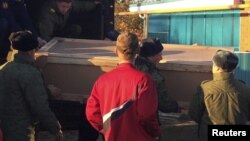The news of Russia's first casualty among its troops in Syria is remarkable not only because his family doubts the official explanation for his death — that he committed suicide — but also for the fact that it was uncovered by social media sleuths.
Conflict Intelligence Team, an online group founded by Russian blogger Ruslan Leviev, discovered the Russian contract serviceman's death on October 25 by combing through social media pages.
Responding to emailed questions from VOA's Moscow bureau, Leviev said his group was looking to confirm earlier reports of Russians being killed in Syria.
"During our routine work, we found a message on the death of Vadim Kostenko," he said. "We contacted his friends and relatives and verified that he indeed was an active contract soldier."
Unlike previous reports of Russian troop deaths in Syria, which remain unconfirmed, Russian defense officials were quick to respond to Leviev's discovery by acknowledging the death, while labeling it a suicide.
They said Kostenko, 19, hanged himself because of “personal problems” involving a relationship, a story his family said has no merit.
Relatives of the air force technician held a funeral for him Wednesday in his village of Grechnaya Balka. They told reporters he had a good relationship with his girlfriend, showed no signs of depression and would never have hanged himself, and they cited suspicious injuries on his body.
Russia's Chief Military Prosecutor's Office said it was investigating the circumstances of Kostenko's death, but it also agreed with the military's assessment of the death as suicide by hanging.
Blaming the victim
Russia's human rights commissioner, Ella Pamfilova, called for a thorough and impartial investigation. In comments to Russia's Interfax news agency, Pamfilova cited the Soviet practice of blaming the victim to cover up wrongdoing or incidents authorities want to keep quiet.
"Unfortunately,” she told Interfax, “the practice still exists and the military is no exception."
VOA's Moscow bureau contacted Pamfilova's office, which confirmed her comments to Interfax but said she was unavailable to answer additional questions because of health reasons.
Casualties kept secret
In May, Russia's President Vladimir Putin signed a law declaring all military casualties state secrets. Anyone who makes them public can be punished with up to seven years in prison.
Leviev said that regardless of the law, his group would continue to release information on Russian military deaths abroad that it can confirm, because the work is important.
"Russian opposition politicians pay almost no attention to Russia's military conflicts abroad and don't conduct their own investigations," he said. "At the same time, Russia's national media spew absurd information and hate-inducing propaganda. We try to present an alternative view, show objective, impartial information."
But he said his group does take precautions, as he thinks there is a high probability that a criminal case will be opened against it.
"When we do offline work, we often post fake information on our whereabouts," he said. "We also have lawyers ready to protect us."
The Russian authorities apparently do not consider Kostenko a military casualty — at least, not one they need to keep secret amid a state media blitz about Russia's “successful” bombing of “terrorists” in Syria. The U.S.-led anti-Islamic State coalition said Russia is mainly bombing rebels who are fighting against Moscow's ally, Syrian President Bashar al-Assad, not Islamic State targets.
In contrast, Russian troops killed while “volunteering” to fight alongside rebels in eastern Ukraine have been quietly buried back home, while activists say their families are threatened with the loss of benefits if they do not stay silent. Social media groups keeping tallies estimate hundreds of Russian troops have been killed in Ukraine, while Russian authorities continue to deny sending any fighters, claiming any Russians fighting there are volunteers.
Alleged corruption
Internet sleuthing has also exposed alleged corruption that continues to embarrass Russian leaders.
The team led by Russian opposition leader and anti-corruption blogger Alexei Navalny regularly posts exposes alleging corruption among members of the elite. It uses drones to gather video evidence of luxurious estates traced to officials through its sources and publicly available documents.
Navalny's most recent expose alleged that Russian Defense Minister Sergey Shoigu has been hiding a home worth an estimated at $18 million by putting it in the name of his relatives. The house in question is located in the same luxurious Moscow suburb where Putin has his official residence.
Previous probes by Navalny accused former Russian railways chief Vladimir Yakunin, Putin's national security adviser Nikolai Patrushev and Kremlin spokesman Dmitry Peskov of similarly hiding multimillion-dollar homes. They all denied any wrongdoing.
Navalny's team this summer alleged that Peskov had a luxuriously expensive wedding and honeymoon with Olympic figure-skating champion Tatiana Navka. Peskov was shown wearing a watch valued at $600,000. He claimed the watch was a gift from Navka, who disputes the estimated value.
Authorities strike back
To combat online information that portrays top officials in a negative light, the Kremlin enlists paid trolls to attack their critics and deflect attention.
In addition, Russia's successor to the Soviet KGB security service, the FSB, has sought to make information on who owns Russia's mansions a secret.
The Russian authorities are also tightening their legal grip on the Internet.
On Wednesday, the human rights group Freedom House released its annual assessment of Internet freedom worldwide. It lowered Russia's Internet freedom ranking to “not free” from a “partially-free” ranking last year.
Citing an amendment to the criminal code approved by Putin that increased penalties for “extremism,” Freedom House said this vague term “has been applied to the work of nongovernmental organizations and independent media outlets.”
According to the human rights group, the Russian government continues to censor content related to the conflict in Ukraine and to anti-government protests at home. Freedom House also expressed concern about a new data law requiring companies to host their information on local servers, saying it could make the firms “more susceptible to government surveillance.”




